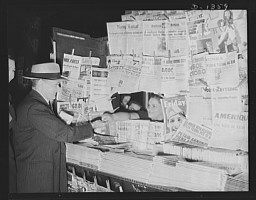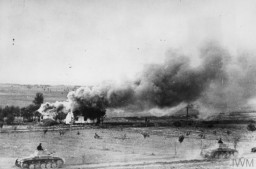<< Previous | Displaying results 6421-6430 of 6719 for "" | Next >>
-
Freedom of Press
Photo(1941-1942) Crowded newsstands in the United States such as these held journals representing various political parties and ideologies. Americans had access to many different perspectives about what was happening at home and abroad during the war.

-
German tanks during Operation Barbarossa
PhotoGerman tanks pass a burning Russian village during Operation Barbarossa, the invasion of the Soviet Union, in the summer of 1941. © IWM (HU 111382)

-
Our Springtime
SongMordecai Gebirtig, Yiddish folk poet and songwriter, was born in 1877 in Krakow, Poland. Gebirtig was confined in the Krakow ghetto in March 1942. He wrote "Our Springtime" in April 1942. The lyrics describe the bleakness and despair of ghetto life.
-
Shifrele's Portrait
SongYiddish folk poet and songwriter Mordecai Gebirtig was born in 1877 in Krakow, Poland. He wrote "Shifrele's Portrait" was written in Krakow in December 1939, shortly after the outbreak of World War II. Gebirtig's eldest daughter, Shifre, lived in Lvov, and was separated from her family when the Soviets annexed Lvov. In this brief song, Gebirtig, gazing at his daughter's photograph, imagines himself in conversation with her. She assures him that the war will end soon, and that parent and child will be…
-
Your Kitten is Hungry
SongMordecai Gebirtig, born in 1877 in Krakow, Poland, was a Yiddish folk poet and songwriter. Gebirtig had three daughters, for whom he wrote and performed his poems. The words were set to improvised melodies, and most of his songs resemble entries in a diary. Many of Gebirtig's poems contain themes of eastern European Jewish life in the 1920s and 1930s. The lullaby "Your Kitten is Hungry" dates from the early 1920s. The lyrics, addressed to a hungry child, evoke the themes of hunger and deprivation.
-
Avreml the Pickpocket
SongMordecai Gebirtig, born in 1877 in Krakow, Poland, was a Yiddish folk poet and songwriter. Gebirtig had three daughters, for whom he wrote and performed his poems. The words were set to improvised melodies, and most of his songs resemble entries in a diary. Many of Gebirtig's poems contain themes of eastern European Jewish life in the 1920s and 1930s. The lyrics to "Avreml the Pickpocket" address two social issues, crime and the collapse of family life, arguing that both find their roots in poverty and…
-
Rejoice, Make Merry, Children
SongMordecai Gebirtig, born in 1877 in Krakow, Poland, was a Yiddish folk poet and songwriter. Gebirtig had three daughters, for whom he wrote and performed his poems. The words were set to improvised melodies, and most of his songs resemble entries in a diary. Many of Gebirtig's poems contain themes of eastern European Jewish life in the 1920s and 1930s. The lyrics to "Rejoice, Make Merry, Children" contain a springtime motif that recurred in other Gebirtig works. In the lyrics, an elderly narrator urges…
-
Moments of Despair
SongYiddish folk poet and songwriter Mordecai Gebirtig was born in Krakow, Poland, in 1877. "Moments of Despair" was written in Krakow in September 1940 on the first anniversary of the German invasion of Poland. The lyrics to this piece comment upon a year of persecution and the uncertainty of the future.
-
Moments of Confidence
SongThis piece was written in Krakow on October 2, 1940. Mordecai Gebirtig wrote this song to raise the spirits of the persecuted Jewish community in Krakow. The poet's reference to "Haman" alludes to the ancient Persian enemy of the Jewish people.
-
Our Town is Burning
SongMordecai Gebirtig, born in 1877 in Krakow, Poland, was a Yiddish folk poet and songwriter. He wrote "Undzer shtetl brent!" in 1936, following a pogrom in the Polish town of Przytyk. During the war, the song became popular in the Krakow ghetto and inspired young people to take up arms against the Nazis. It was sung in many ghettos and camps, and translated into Polish and several other languages. Gebirtig was killed in June 1942 during a roundup for deportation from the Krakow ghetto. Today, "Undzer…
